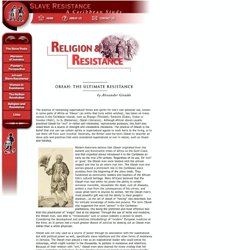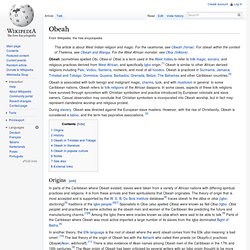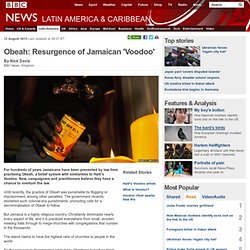

Obeah Rituals. Religion and Resistance. The practice of harnessing supernatural forces and spirits for one’s own personal use, known in some parts of Africa as ‘Obeye’ (an entity that lives within witches), has taken on many names in the Caribbean islands, such as Shango (Trinidad), Santeria (Cuba), Vodun or Voodoo (Haiti), Ju-Ju (Bahamas), Obeah (Jamaica),.

Although African slaves usually practiced Obeah for "evil" or rather self-interested, instrumental purposes, this faith also aided them as a source of strength and clandestine resistance. The practice of Obeah is the belief that one can use certain spirits or supernatural agents to work harm to the living, or to call them off from such mischief. Generally, the British used the term Obeah to describe all slave acts and practices that were considered supernatural or evil in nature, such as rituals and fetishes. Obeah men played a central role in the conception and development of any serious attempt at rebellion. "In St. Ought of falling victim to their magic.
Obeah. During slavery, Obeah was directed against the European slave masters.

However, with the rise of Christianity, Obeah is considered a taboo, and the term has pejorative associations. [3] Origins[edit] In parts of the Caribbean where Obeah existed, slaves were taken from a variety of African nations with differing spiritual practices and religions. It is from these arrivals and their spiritualisms that Obeah originates. The theory of origin that is most accepted and is supported by the W. Obeah came to mean any physical object, such as a talisman or charm, that was used for evil magical purposes.[13] Obeah incorporated various beliefs from the religions of later migrants to the colonies it was present.
History[edit] The term 'obeah' is first found in documents from the early 18th century, as in its connection to Nanny of the Maroons, but discussion of it becomes more frequent after it was made illegal in Jamaica after Tacky's War, in which an obeahman provided advice to the rebels. Jamaican Obeah Voodoo Rituals : Esoteric Voodoo items, Vodun, Vudu, Saints items. Obeah: Resurgence of Jamaican 'Voodoo' 12 August 2013Last updated at 20:31 ET By Nick Davis BBC News, Kingston For hundreds of years Jamaicans have been prevented by law from practising Obeah, a belief system with similarities to Haiti's Voodoo.

Now, campaigners and practitioners believe they have a chance to overturn the law. Until recently, the practice of Obeah was punishable by flogging or imprisonment, among other penalties. The government recently abolished such colonial-era punishments, prompting calls for a decriminalisation of Obeah to follow. But Jamaica is a highly religious country. The island claims to have the highest ratio of churches to people in the world. So the proposal to decriminalise what many Christians regard as black magic, a scam, or even evil, is highly controversial. 'The gift' Continue reading the main story National heroine One of Jamaica's seven national heroes is Nanny of the Maroons, whose face now appears on the island's $500 banknote.
"I have nothing to hide, it's what I do, and that's my work.